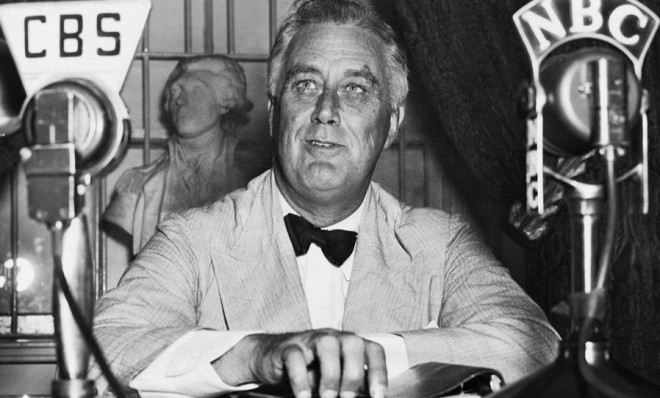Today in history: The birth of Social Security
FDR's critics called it socialism

A free daily email with the biggest news stories of the day – and the best features from TheWeek.com
You are now subscribed
Your newsletter sign-up was successful

Aug. 14, 1935: President Franklin Roosevelt signed the Social Security Act, which guaranteed an income for the unemployed and retirees. Social Security was initially created to combat unemployment, but now functions as a safety net for retirees and the disabled. It has remained relatively unchanged for 75 years. Social Security is funded mostly through payroll taxes called Federal Insurance Contributions Act tax (FICA).
When FDR launched Social Security, the United States was mired in the Great Depression, and poverty rates among senior citizens were estimated to be over 50 percent. Social Security was attacked by FDR's critics, who called it "socialism."
Signing the Social Security Act into law, FDR said, "We can never insure 100 percent of the population against 100 percent of the hazards and vicissitudes of life, but we have tried to frame a law which will give some measure of protection to the average citizen and to his family against the loss of a job and against poverty-stricken old age."
The Week
Escape your echo chamber. Get the facts behind the news, plus analysis from multiple perspectives.

Sign up for The Week's Free Newsletters
From our morning news briefing to a weekly Good News Newsletter, get the best of The Week delivered directly to your inbox.
From our morning news briefing to a weekly Good News Newsletter, get the best of The Week delivered directly to your inbox.
In 1937, Social Security paid out $1.28 million to 53,236 recipients. Today, nearly 52 million recipients receive some $730 billion — an average of $14,160 each per year.
Some analysts warn that the future of Social Security is uncertain. They point out that when the program began in 1935, average life expectancy was about 62; today it is 78.7. That, combined with the tens of millions of baby boomers (born between 1946 and 1964) who are now retiring, is pressuring Social Security, and there is growing pressure by some to raise taxes, lift eligibility ages, reduce benefits — or some combination of these — to keep the program on an even keel.
Aug. 14, 1945: President Harry Truman announced the surrender of Japan, bringing an end to World War II. Despite having two cities — Hiroshima and Nagasaki — destroyed by atomic bombs, and having war declared against it by the Soviet Union, some Japanese wanted to keep on fighting. Emperor Hirohito intervened, and in a radio address, called the Gyokuon-hōsō ("Jewel Voice Broadcast"), he announced that the Japanese Empire would surrender.
Quote of the Day
A free daily email with the biggest news stories of the day – and the best features from TheWeek.com
"We can never insure 100 percent of the population against 100 percent of the hazards and vicissitudes of life." –Franklin Roosevelt
More from West Wing Reports...